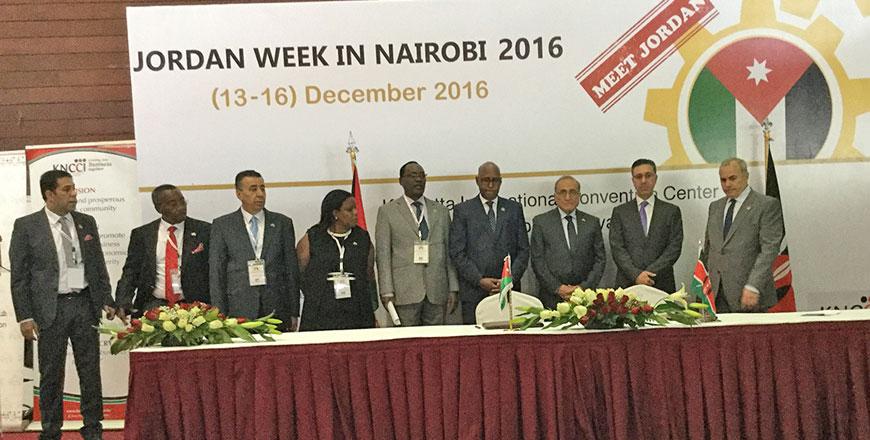You are here
Jordan should exercise caution as it forges new trade partnerships
By Ahmed Bani Mustafa - Mar 29,2018 - Last updated at Mar 29,2018
AMMAN — Establishing a Jordanian-Kenyan free zone in Aqaba would boost trade exchange with many African countries; however, the project has to be well studied to avoid unfavourable fallouts, Jordanian economists said.
During the recent meeting of the Jordanian-Kenyan Business Forum, the government announced that a study was under way to create a free zone in Aqaba, the Jordan News Agency, Petra, reported on Monday.
State Minister for Investment Affairs Muhannad Shehadeh said that the zone aims to create Kenyan and joint investments to boost trade exchange with Kenya and other African countries.
Shehadeh said that the two countries were negotiating customs incentives agreements to increase the trade volume, which is still low at $14 million a year.
The agreement would help the Kingdom enter Kenya, which, in turn, would be a gateway to other African countries, the minister was quoted by Petra as saying.
During the forum, Shehadeh urged Jordanian businesspeople to establish a logistics company in Mombasa, Kenya’s main seaport, to facilitate procedures for marketing Jordanian products in the African nation, which opened its embassy in Amman last year.
In light of the closure of several markets such as Syria, Iraq and Libya, the Kingdom needs to open new markets to increase exports and support the industrial sector, Yousef Damra, an economist, said Wednesday.
The zone would also attract international investors to establish manufacturing facilities to export to Africa, which would create more jobs for Jordanians, Damra told The Jordan Times.
“Yet, the government should take into consideration the competitive features of Jordanian products destined for the Kenyan market to avoid the repetition of previous experiences that were not in favour of the Jordanian industrial sector,” said Damra.
Veteran economist and banker, Mifleh Aqel, said that establishing the zone should be preceded by other measures such as evaluating the trade volume on a longer term to ensure that the Jordanian economy would benefit from the new project.
“As Kenya has access to far-eastern countries, its market should be well examined in terms of how competitive Jordanian products would be,” Aqel said.
For Mazen Irsheid, another pundit, the plan would provide new destinations for the Kingdom’s exports and the industrial sector.
Kenya could be a promising gateway to African consumers when the trade balance tilts in favour of Jordan, according to Irsheid.
He agreed with the recent government’s decision to freeze the Free Trade Agreement (FTA) with Turkey as it had harmed the Jordanian industry.
The trade volume stood at JD600 million, of which JD500 million were imports from Turkey, he said.
Meanwhile, the Jordan-US FTA is a fruitful deal, he said, as the Kingdom’s exports to the American market reach JD1 billion, while the imports are around JD950 million.
Reaching out to African trade partners has been part of a plan to open new markets after Jordan’s traditional markets and trade routes have become almost blocked due to regional political instability.
Also in 2017, Jordan and Kenya agreed to establish a joint business council to exchange economic information and feasibility studies, in addition to launching the Jordanian-Kenyan business forum.
Chairman of the Kenya National Chamber of Commerce and Industry Kiprono Kittony said Kenya is open to investment and ranks fourth in the world as an investment-attracting destination adding that Kenya serve as an entry point for Jordan to reach the markets of East Africa, which has a population of 150 million people, according to Petra.
Jordan can also benefit from the markets of the COMESA countries, or “Common Market for Eastern and Southern Africa”, according to Kittony.
Related Articles
AMMAN — Minister of State for Investment Affairs Muhannad Shehadeh on Monday called on the Jordanian business community to establish a logis
AMMAN — State Minister for Investment Affairs Muhannad Shehadeh on Wednesday said that Kenya has pledged to consider granting customs incent
AMMAN — Deputising for His Majesty King Abdullah, Deputy Prime Minister for Economic Affairs and Minister of State for Investment Affairs Ja

















